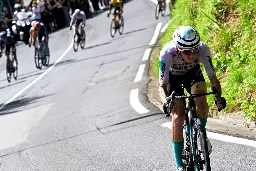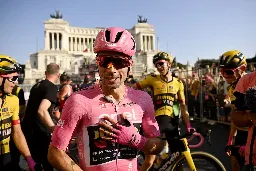The four-time Tour de France winner was not selected for this year's Tour de France for performance reasons, Israel-Premier Tech boss Sylvan Adams says

As much as this message may be urgent, this is not the right sub for it. There's no technology angle to the article.
What I love so much about pro cycling nowadays is how plentiful the resources in expert race analysis are and how deep the access is to the cyclists in the ground. Between YouTube Channels and podcasts, you can get alternative live coverage of a stage from the Lanterne Rouge YouTube channel or get race analysis in podcast form by current pros (and as was the case with Geraint Thomas at this year's Giro the actual GC leader of the race!).
The accompanying coverage has become a major part of my excitement of watching pro cycling.
So I was wondering: What YT channels, podcasts or else are you guys listening to or watching this season?
TIL there's hydrogen peroxide in honey.
Basque rider racing to raise funds to replant in local deforested areas

Netflix follows Tour de France: Unchained with documentary profiling Manx Missile
Stage from Amorebieta-Etxano to Bayonne extended by 6.1 kilometres


They sneakily turned around their signs when the camera was on them.
Does anybody have any background on this? Are there people in Bilbao who dislike the Guggenheim Museum so much that they protest it during a TdF stage?
US-registered WorldTour team secures major boost to budget ahead of Tour de France
The ball is now in Musk’s court.

The newest season of Black Mirror is a stale collection of shallow, unfulfilling stories.
Full article: >Joan is an ordinary woman with ordinary complaints. She wishes the coffee at her office tasted better. She thinks her new hairstyle might be a bit much. She loves her fiancé, but worries their sex life isn’t as exciting as it should be. “I feel like I’m not the main character in my own life story,” she explains at a therapy session. When her therapist asks her if she would like that to change, she nods.
>Because Joan (played by Annie Murphy) is a protagonist on the newest season of Black Mirror, the Netflix anthology series about the tenuous relationship between humans and technology, she gets her wish—and then some. She becomes the unwitting lead character of Joan Is Awful, a TV series on a Netflix-like streaming platform called Streamberry, in which the actress Salma Hayek (playing herself) plays Joan. But while this premise may sound like the type of meta, kooky concept that Black Mirror once had delicious fun with, the resulting story is inert. “Joan Is Awful”—the Black Mirror episode, not the Streamberry show—is a mess of thinly drawn characters, with a plot that ultimately amounts to a lazy parody of Netflix. The story quickly spirals into a litany of exposition dumps about how Streamberry can exploit Joan so easily, culminating with a bunch of tired jokes about how people should read their terms-and-conditions documents more carefully.
>Season 6, the first since 2019, is characterized by this unfulfilled potential. Other episodes are similarly ambitious—and similarly disappointing, despite how significantly different the season feels from previous ones. The new collection of stories includes several set in the past as opposed to the near future, and dabbles in farcical comedy and supernatural horror. This season is also preoccupied with content—our overconsumption of it, our inability to ignore it, and our obsession with making more of it. But much like “Joan Is Awful,” these fresh setups only produce stale storytelling.
>Again and again, Black Mirror seems poised to deliver a sharp message only to opt for superficial conclusions. In “Loch Henry,” a filmmaking couple working on a true-crime documentary about a local murderer become personally involved with the case. But the central mystery is so predictable and tedious—less The Jinx, and more a forgettable TLC special—that the episode morphs into a dull thriller, offering trite commentary about the public’s insatiable need for true-crime stories. “Mazey Day,” the shortest installment, follows Bo (Zazie Beetz), a paparazzo who goes to extreme lengths to capture a shot of a movie star in rehab during the early 2000s. After Bo’s dogged work leads to tragedy in the opening minutes, the story appears ready to provide critical observations about public figures and their right to privacy—but even with a surprising, un–Black Mirror–esque twist, the episode shifts tonal gears so quickly, it turns a starlet’s plight into a punny, episode-ending punch line. Both episodes are missed opportunities: They frustrate not only for their failure to pinpoint modern anxieties—something Black Mirror has done so well in the past—but also for handling their potent subjects so lazily.
>“Beyond the Sea,” the season’s feature-length third episode, may be the most undercooked. On paper, the story is a big swing: Set in an alternate 1969, it tells the story of two astronauts, David (Josh Hartnett) and Cliff (Aaron Paul), who can transfer their minds into robot replicas of themselves on Earth, allowing them to spend time with their loved ones. When David’s family is killed by a cult and his replica destroyed, Cliff lets David borrow his replica, which means that David’s consciousness gets to enter Cliff’s machine body. But the tantalizing framework yields a strangely lethargic story. The cult, which was targeting “unnatural” families, is never mentioned again. The psychological effects of spending time in another person’s body go unexplored. “Beyond the Sea” instead spends an inordinate amount of time on David’s affection for Cliff’s wife, which leads to an unearned love triangle. The show has tackled infidelity and unconventional attraction before—in the first season’s “The Entire History of You” and the fifth’s “Striking Vipers”—but in far more shrewd and thoughtful ways. Those earlier episodes explored how technology often encourages strong emotions in the form of lust and jealousy; this one merely feels like a derivative drama with a bloated budget.
>At its best, Black Mirror used unfamiliar worlds and extreme hypotheticals to reframe familiar concerns about society’s ills. A deceased person’s social-media accounts became an artificial-intelligence-assisted service in the touching “Be Right Back.” The dark allure of achieving stardom through reality TV was represented by a dystopia of stationary bikes and endless talent shows in the dazzling “Fifteen Million Merits.” The brutality of the justice system—and our compulsion to record footage—became an amusement park built to torture a convict in the terrifying “White Bear.”
>That ingenuity is largely missing from Season 6. There are glimmers of originality—the last episode gives its protagonist, a quiet salesgirl who pockets a dangerous talisman, a truly inspired scene partner—but the show is apparently disinterested in what has been one of its main subjects: how carelessly humans treat the innovations meant to better their lives. In an interview, the series’s creator, Charlie Brooker, explained that he “approached this season thinking, ‘Whatever my assumptions are about Black Mirror, I’m going to throw them out and do something different.’” Season 6 certainly succeeds in being distinct, but at a cost. Black Mirror’s new stories are more concerned with changing the show’s reputation as a speculative science-fiction series than with actually critiquing technology. And as much as the season brings up relevant innovations, its mentions of artificial intelligence and deepfakes are perfunctory at best. Like Joan, the show wanted to be the main character—and, like Joan Is Awful, ended up making nothing new.
'I'm too switched off right now' Slovenian says at official Giro d'Italia victory celebration



